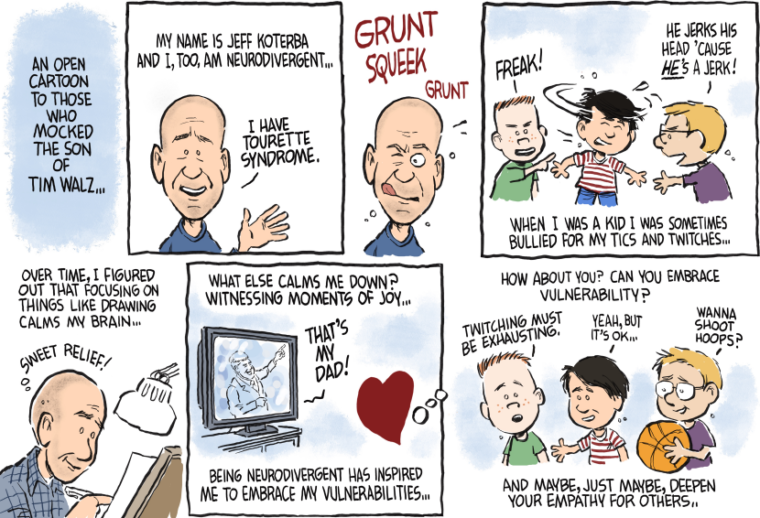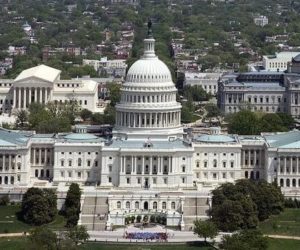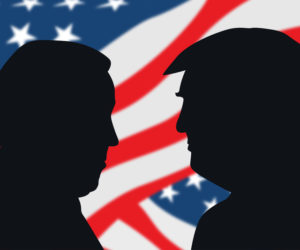
by Elwood Watson
Like millions of Americans, my heart melted watching Gus Walz, the teenage son of vice presidential candidate Tim Walz, leap from his seat to shout “That’s my dad! That’s my dad!” during the Democratic National Convention.
Walz suffers from a learning disability, but that didn’t stop some on the right for mocking the passion displayed during one of the event’s defining moments.
Longtime conservative commentator Ann Coulter wrote “Talk about weird …” in a social media post that has since been deleted. Wisconsin radio host Jay Weber went even further, writing (then deleting) on social media, “Sorry, but this is embarrassing for both father and son. If the Walz’s represent today’s American man, this country is screwed.” He also described Walz’s son with an expletive, then later claimed he wasn’t aware of the teenager’s learning disability, as if that would make the attack fair game.
By the way, Weber’s radio program was summarily cancelled.
Tommy Vietor, a co-host on Pod Save American and a former Barack Obama staffer, mocked Coulter in the replies of her since-deleted post.” I can see why a child loving their parents would feel foreign to you,” he wrote. Attorney and TV celebrity Star Jones was more blunt, writing on Instagram, “There is a special place in Hell for adults who bully children.”
One can only wonder what would prompt Coulter and others on the right to deride Walz expressing genuine love for his father. Perhaps, Coulter and other members of her right-wing fraternity – who made heinous comments too obscene to repeat – are unaware of the deep, unrestrained affinity and admiration on display between father and son. Jealousy? Resentment? Political opportunism? Regardless, it was a disgraceful, tasteless display of behavior.
That being said, there were some on the right who praised Walz’s. Daily Wire co-founder Ben Shapiro, a supporter of Donald Trump, described Walz’s reaction on social media as “really quite nice.” Meghan McCain, daughter of the late Republican Senator John McCain, criticized any accounts attacking Gus.
The exchange between Walz and his son is noteworthy for a multitude of reasons independent of partisan politics. There has been no shortage of articles and literature chronicling the supposed crisis in male relationships. Websites and publications such as Salon, Men’s Health, Psychology Today and others have written at length on the lack of real personal camaraderie and intimacy among American men. Some psychologists and mental health experts have begun to refer to the current situation as a public health crisis.
American men are in a state of crisis when it comes to male companionship. That being said, there are a number of reasons why this situation exists. We live in a society where men are taught to be strong, rugged, and brawny. While these expectations have been punctured to a certain extent, they are still prevalent enough to give many men pause in engaging in behavior that may be seen as deviating from what is seen as appropriate behavior.
To be sure, not all men are held hostage to such isolated experiences. There are some who are secure enough and have no apprehensions opening up and sharing their emotions with other men. They realize that doing so does not make them less masculine or emasculated. In fact, in other parts of the world, particularly in Europe and Africa, men are very intimate with one another. Heterosexual men kissing one another on the cheek, hugging and in some cases, holding hands is common, and no one blinks an eye.
When it comes to relationships and sexuality, America is still a very young nation compared to the rest of the world, and we are evolving on a number of issues. Transforming perceptions of masculinity (and femininity) and sexuality in general is one such issue. Hopefully, as our society moves further into the 21st century, more men will realize bromance is not a sign of vulnerability or weakness, but rather a strong endorsement of manhood.
Copyright 2024 Elwood Watson, distributed by Cagle Cartoons newspaper syndicate. Elwood Watson is a professor of history, Black studies, and gender and sexuality studies at East Tennessee State University. He is also an author and public speaker.
















